Florida official apologizes to woman months after police shot her with rubber bullet at Black Lives Matter protest
LaToya Ratlieff said her eye socket was fractured in the May incident.
More than eight months after being hit in the face by a rubber bullet fired by a police officer during a Black Lives Matter protest in Fort Lauderdale, LaToya Ratlieff said she still suffers excruciating pain despite weekly doctor's appointments and therapies.
The injury that nearly cost her her right eye, she said, has been compounded by the frustration of never having gotten an official apology from the city for the incident that "has changed my life forever."
But this week, Ratlieff said she received a "surprise" phone call from one Fort Lauderdale City Commission member who invited her to his home to issue a personal apology and welcome her to work with him on the issue of police reform.
"She was struck by that projectile in my city commission district. So I said to myself, 'I'm responsible in the sense that this is my city commission district. I need to reach out to her and engage with her, and apologize,'" City Commissioner Ben Sorensen told ABC News. "Equally important to apologizing was to say, 'Hey, let's work together on making policing in Fort Lauderdale even better.'"
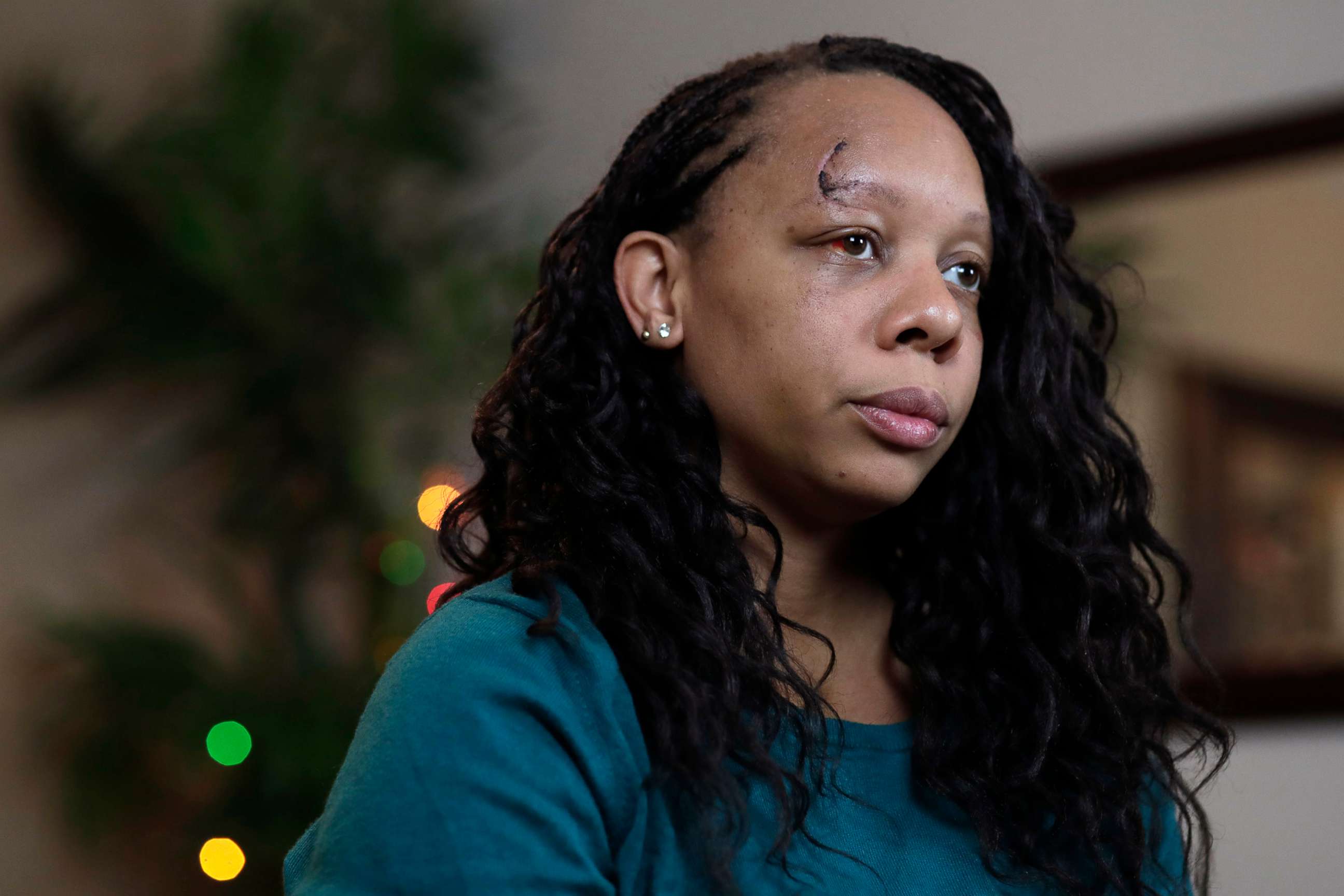
Ratlieff, 35, of Delrey Beach, Florida, told ABC News in a video interview that her meeting with Sorensen and Fort Lauderdale's city attorney, Alain Boileau, on the porch of the commissioner's home gave her a measure of relief that at least one city leader cared about her.
"The last meeting that I had with the city of Fort Lauderdale was back in August," said Ratlieff, who works as a grant writer for a nonprofit group. "I presented some reforms to them and we discussed the incident itself thoroughly, and we discussed what they were looking to do going forward. But even in that meeting, I didn't receive an apology."
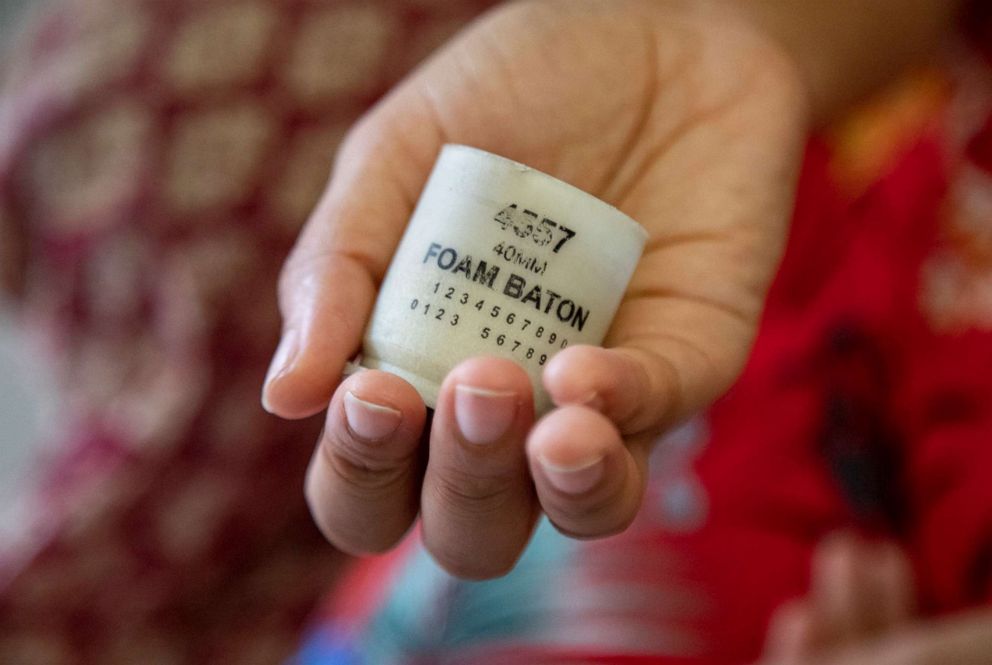
Moments after stepping onto Sorensen's porch, she said she recognized his empathy for her.
"That was something that I'm very appreciative of, because he not only recognized and made an apology for what happened, but he also apologized for what I have to deal with going forward and acknowledged that this is an ongoing process," Ratlieff said. "We vote and elect certain officials and we always hope that they're going to do the right thing, not because they have to but because it's good to do the right thing."
'It happened so quickly'
On May 31, Ratlieff said she marched in a Black Lives Matter protest demanding justice for George Floyd, the 46-year-old Black man who died after a police officer in Minneapolis pinned him to the ground. The video of a white officer kneeling on Floyd's neck as he pleaded for mercy prompted demonstrations across the nation -- some of which turned violent.
"I still don't understand why it went from that very peaceful and positive day, but for whatever reason it transitioned and police officers were tear-gassing us," Ratlieff recalled.
She said that as the smoke in the streets grew thick, she decided to go home. But before she could get to her car, a rubber bullet struck her face a half-inch above her right eye, shattering her eye socket.
"It happened so quickly. It rocked me. I basically fell to the floor, and if it wasn't for individuals that corralled me immediately and helped me, I don't know how long I would have been laying on that ground bleeding," Ratlief said. "I remember feeling this immense pressure and pain, and everything slowed down. I couldn't walk. The people were carrying me. They carried me to a car and when we got to the hospital, they carried me into the hospital entrance area and I had to sit down and wait for someone to help me because I couldn't move."
Cellphone video of the episode showed Ratlieff walking about 30 feet from a group of Fort Lauderdale police officers wearing riot gear and firing tear gas canisters and rubber bullets. The footage showed Ratlieff screaming in pain and holding her hands over her face, blood gushing from her wound.
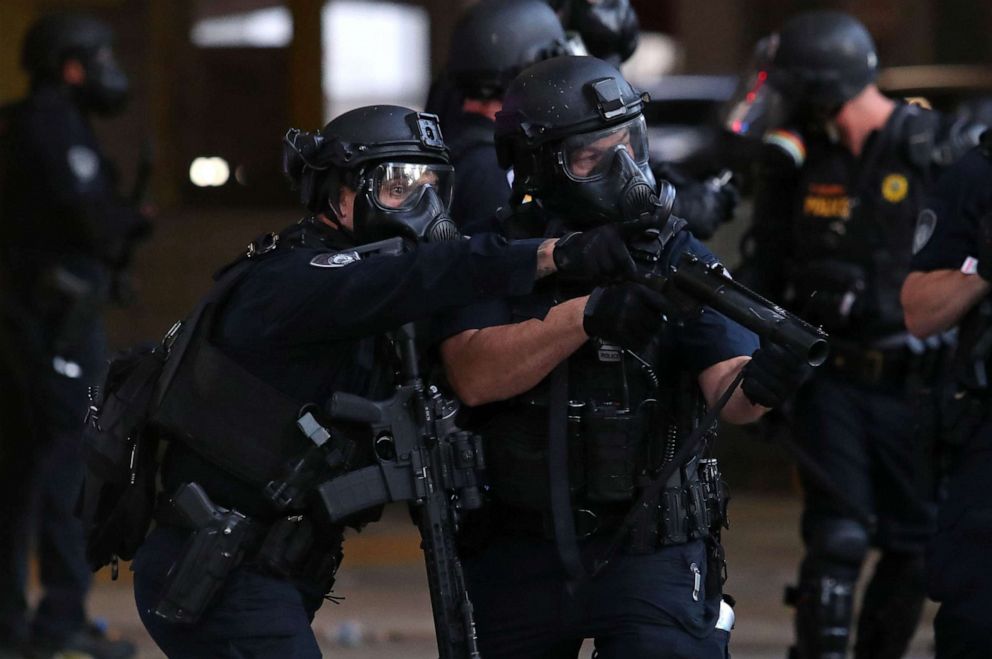
The Fort Lauderdale Police Department released an internal 133-page report in June detailing its response to the May 31 protest. In the document, obtained by the South Florida Sun-Sentinel, the SWAT officer who shot Ratlief said in a statement that the incident was an accident.
The officer, according to his statement, said that he and his colleagues came under attack by protesters, who hurled rocks and bottles at them. He said he was shooting rubber bullets at a protester who threw a tear-gas canister back at police when that demonstrator attempted to conceal himself behind Ratlieff.
Fort Lauderdale Interim Assistant Police Chief Frank Sousa said the incident involving Ratlieff remains under investigation.
"We are conducting a fair and impartial investigation to determine what exactly occurred," Sousa said in an email to ABC News. "At the conclusion of the case, all investigative information will be made public and available for review."
Input on police reform
Sorensen, a former police chaplain in Fort Lauderdale and Hollywood, Florida, said he felt compelled to contact Ratlief before the police investigation concludes.
"There were some articles about LaToya and her feeling as though the city had not engaged with her maybe the way she had hoped," Sorensen told ABC News. "My heart goes out to her for the physical pain, the emotional pain, just navigating work and friends and just everything she's had to kind of go through. So I want to be there to help support her and then help if she's willing, and she is, to kind of work together to improve things so this doesn't happen again."
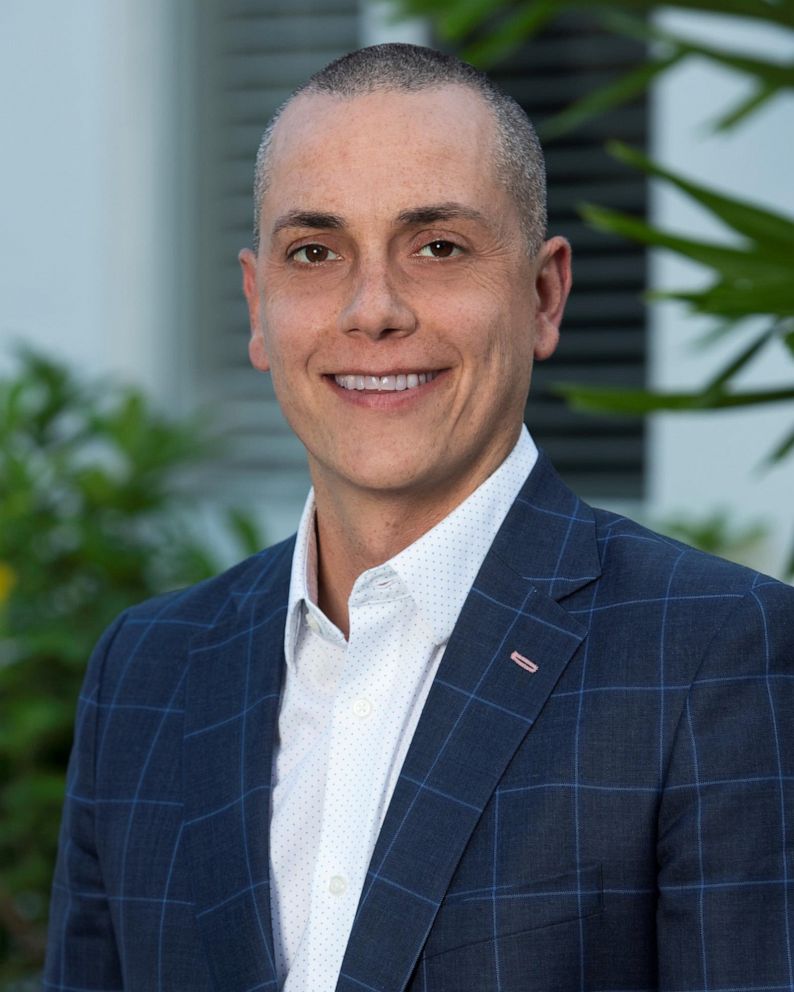
He said during their meeting, he informed Ratlieff that he had received a list of suggestions she submitted to the city on reforms she'd like to see implemented in the Fort Lauderdale Police Department.
Ratlieff said she proposed the formation of an independent police watchdog panel, annual training for police officers in de-escalation and in implicit bias, as well as training on how to deal with people suffering from mental illness. She said she also suggested officers be retrained every three years in the use of non-lethal weapons, including pepper spray, tear gas and guns that fire rubber bullets.
"We talked about going forward, having a continuing conversation as well as inviting other local activists and community groups to the conversation so that everyone has a voice and a seat at the table," Ratlieff said.
Sorensen said some of the proposals Ratlieff made already have been implemented.
"Improving our policing is something I'm passionate about," Sorensen said. "I really appreciated what our men and women in blue do every day, and I think one of the greatest ways to help them and support them is to make sure they've got the right policies, the right training around effective policing."
He added that his apology to Ratlieff is not an official apology on behalf of the city.
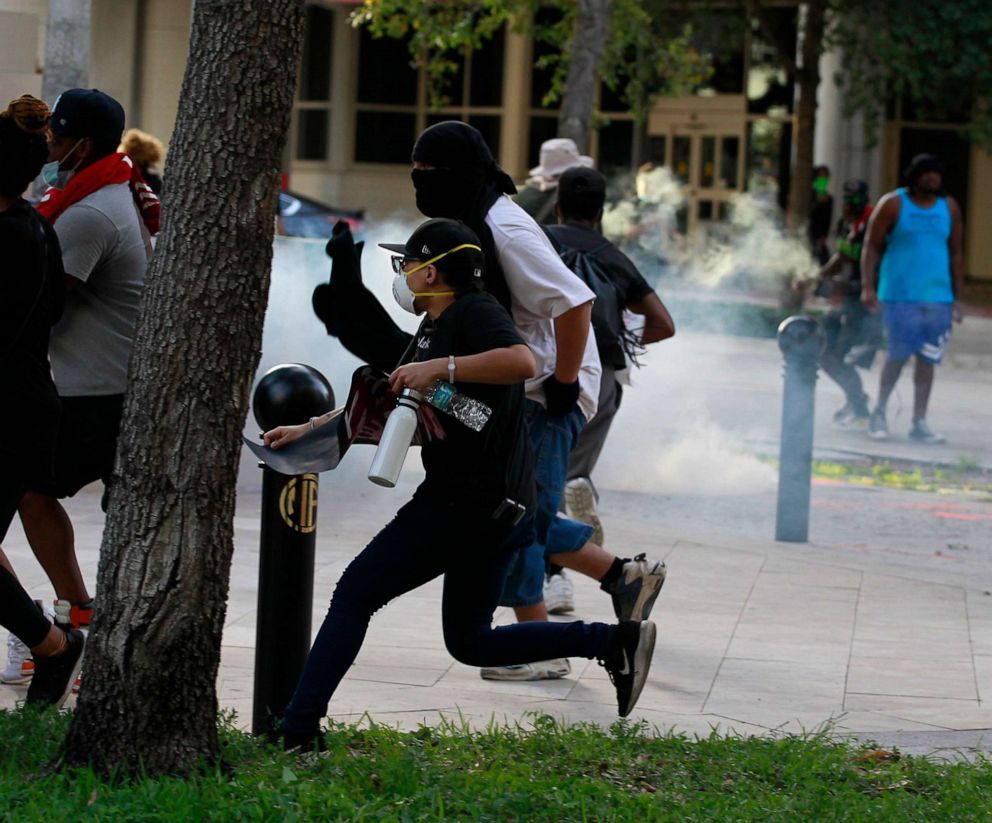
"It's just from me. I'm just one guy, just a city commissioner, and I'm just apologizing," Sorensen said. "I'm sorry this happened. In terms of an official city apology in itself, I'll leave that all to the mayor for doing that kind of thing."
Ratlieff said that while she has retained an attorney, she has not decided whether to sue the city.
"I want to keep that conversation open and ensure that this is an isolated incident that no one else experiences," Ratlieff said.
Others injured by rubber bullets
She said her future remains uncertain.
"I still don't know the extent of what the injuries are going to be, and my life has just changed forever because of this," Ratlieff said. "There's a portion of my vision that has been severely impacted. So it's understanding is this something that's going to be permanent, is this something that can be repaired?"
She said she continues to get headaches and can no longer look at a computer screen for a prolonged period of time, which affects her work.
"This went horribly wrong. We saw that it not only went wrong in Fort Lauderdale but across the country," Ratlieff said, noting how other protesters nationwide also suffered severe injuries after police shot them with rubber bullets.
Experts warn that rubber bullets, a misnomer because they are often made with other non-rubber materials, are much more dangerous than many think.
A study published in 2017 in the BMJ Journal, a peer-reviewed British medical publication, reviewed 25 years of international data regarding death, injuries and permanent disabilities from rubber bullets and found that the trauma of impact may lead to death. Of the articles reviewed, 3% of those struck by rubber bullets died from the injury, with 15.5% suffering permanent injuries such as bowel injuries requiring surgery, splenic trauma leading to removal of the spleen and eye injuries leading to loss of vision.
"So many of those individuals were doing the same thing as me. They weren't doing anything. They were just there exercising their rights," Ratlieff said. "So, I think that's something I hope every department is looking to understand how can they prevent from injuring the community. I hope that's a conversation they're all having."




